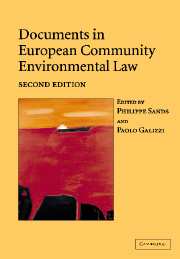Book contents
- Frontmatter
- Contents
- Preface
- PART I General principles of EC environmental law
- PART II European Community institutions and legislation
- 6 EC Treaty, as amended by the 1986 Single European Act, the 1992 Treaty on European Union, the 1997 Treaty of Amsterdam, the 2001 Treaty of Nice and the 2003 Act of Accession (selected articles)
- 7 Council Regulation (EEC) No 1210/90 of 7 May 1990 on the establishment of the European Environment Agency and the European environment information and observation network (OJ L 120 11.05.1990 p. 1)
- 7A Decision of 21 March 1997 on public access to European Environment Agency documents (OJ C 282 18.09.1997 p. 5)
- 8 Council Resolution of 7 October 1997 on the drafting, implementation and enforcement of Community environmental law (OJ C 321 22.10.1997 p. 1)
- PART III The relationship between environmental protection, financial assistance and free trade
- PART IV Procedural techniques of environmental protection
- PART V Protection of air quality
- PART VI Biodiversity and nature conservation
- PART VII Waste
- PART VIII Dangerous substances
- PART IX Water quality
8 - Council Resolution of 7 October 1997 on the drafting, implementation and enforcement of Community environmental law (OJ C 321 22.10.1997 p. 1)
from PART II - European Community institutions and legislation
Published online by Cambridge University Press: 06 January 2010
- Frontmatter
- Contents
- Preface
- PART I General principles of EC environmental law
- PART II European Community institutions and legislation
- 6 EC Treaty, as amended by the 1986 Single European Act, the 1992 Treaty on European Union, the 1997 Treaty of Amsterdam, the 2001 Treaty of Nice and the 2003 Act of Accession (selected articles)
- 7 Council Regulation (EEC) No 1210/90 of 7 May 1990 on the establishment of the European Environment Agency and the European environment information and observation network (OJ L 120 11.05.1990 p. 1)
- 7A Decision of 21 March 1997 on public access to European Environment Agency documents (OJ C 282 18.09.1997 p. 5)
- 8 Council Resolution of 7 October 1997 on the drafting, implementation and enforcement of Community environmental law (OJ C 321 22.10.1997 p. 1)
- PART III The relationship between environmental protection, financial assistance and free trade
- PART IV Procedural techniques of environmental protection
- PART V Protection of air quality
- PART VI Biodiversity and nature conservation
- PART VII Waste
- PART VIII Dangerous substances
- PART IX Water quality
Summary
Editorial note
The Council Resolution on the drafting, implementation and enforcement of Community environmental law (7 October 1997) recognises the importance of the quality of drafting of Community legislation to make it more accessible. It also affirms that environmental legislation will only be effective if fully implemented and enforced. The Resolution recognises the peculiarity of environmental legislation and acknowledges that its distinct nature is to be taken into consideration when drafting, implementing and enforcing environmental law (paragraph 2). The characteristics and circumstances of environmental protection help explain the complex and not always satisfactory implementation and enforcement of environmental law (paragraph 4). Paragraphs 5–10 deal specifically with the drafting of environmental legislation and the Council invites the Commission to, inter alia, consult the main actors concerned at an early stage of a draft proposal, provide explanatory memoranda of proposals with detailed information, study the overall coherence of Community environmental legislation and suggest possible improvements without lowering the level of environmental protection. Paragraphs 11–14 deal with the transposition and practical application of environmental law and stress the need to deal systematically with problems encountered in this respect. Paragraphs 15–18 stress the importance of inspections to achieve the objective of application and enforcement of environmental law in the Member States. Paragraphs 19–23 recognise the role IMPEL plays in the improvement of implementation of environmental law and call for its further development. Paragraphs 24–28 finally deal with complaints of, and legal protection for, citizens and non-governmental organisations and call for the development of existing and new initiatives to improve awareness, knowledge and application of Community environmental law.
- Type
- Chapter
- Information
- Documents in European Community Environmental Law , pp. 185 - 192Publisher: Cambridge University PressPrint publication year: 2006
- 2
- Cited by



